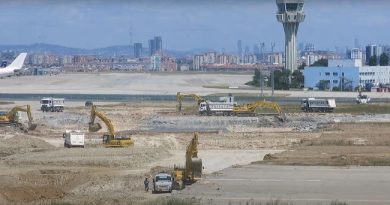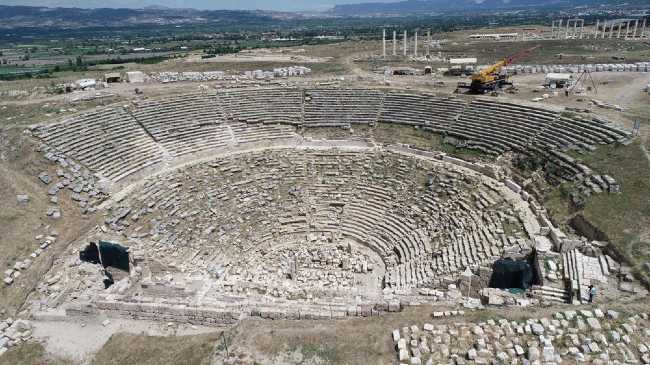TOKI to Construct 500,000 Homes by 2003
 TOKİ will construct another 500,000 homes by 2023, Turkish PM says
TOKİ will construct another 500,000 homes by 2023, Turkish PM says
The Turkish Housing Development Administration, or TOKİ’s, objective after the general elections in June will be to build some 500,000 homes by 2023, Turkish Prime Minister, Recep Tayyip Erdoğan said Friday.
“When we first set TOKİ’s 500,000-home objective in 2003, everyone was suspicious on whether the aim would be met in a 10-year period,” Erdoğan said during a speech at the opening ceremony for the TOKİ Housing Convention taking place Friday and Saturday in Istanbul.
“TOKİ has already managed to build some 483,000 in less than eight years,” the prime minister said, adding that another half-a-million homes to be constructed by 2023 was the administration’s next challenge.
Erdoğan also compared efficiency of the housing administration over time, saying that TOKİ had constructed some 43,000 homes during the 19-year period from its establishment to 2003, when the Justice and Development Party, or AKP, took over, compared to 483,000 it has built between 2003-2010.
The chairman of the International Society for City and Regional Planners, or ISOCARP, Ismael Fernandez Mejia, said however in his speech that constructing an impressive number of homes was not enough to address urbanization concerns. “Are we creating cities or just dwellings with no quality of life?” he asked, adding that while most of urbanization projects all over the world tried to solve the housing problem from a numerical point of view, more social problems were emerging.
“Livability in newly urbanized areas is not solved yet,” Mejia said, adding that institutions for public services such as health, education, culture, entertainment and green areas, as well as infrastructure and commercial sites had to accompany the construction of new homes and that energy and environmental issues had to be addressed, too.
Shanty neighborhoods are the most serious concern in Istanbul, according to Erdoğan, who said such neighborhoods were established as a result of populist politics in the past. Recalling that the shanty-neighborhoods phenomenon in Istanbul had been prevented at an almost 100 percent rate, the prime minister said: “However, we have not reached our objective yet. Istanbul must not look like the Istanbul we see today, we must transform it.”
He said this could be realized only through a state-citizen partnership. “It is at this point that we face serious difficulties, as citizens are not [always as comprehensive and] cooperative.”
There will be two priorities for Turkey’s housing sector in the coming years: first, making homes resistant to earthquakes and other natural disasters, and two, urbanize in a healthy way, thus being a good example for other countries in the world as well, Erdoğan said.
“Turkey can be a good example of how to deal with the challenges of urbanization, to countries in the region and all over the world,” said Joan Clos, the chairman of UN HABITAT, the United Nations Organization’s agency fro human settlements, in his opening speech for the convention.
Recalling that more than half of the world’s population lives in urban areas, Clos said one of the biggest urbanization challenges for countries nowadays was the ability to absorb low-skilled labor coming from rural areas to technology-intensive industrial environment in urban areas. “We are facing urbanization with very weak industrialization,” he said, adding that this was also accompanied with high rates of unemployment in cities, due to immigration from rural to urban areas.
The housing sector is an anchor for addressing the present financial, environmental, housing and employment crises through which the world is going through nowadays, according to Saskia Sassen, a sociologist at Columbia University, who also gave a speech at the convention.
“Any economy that focuses on housing is making an enormously significant contribution to economic growth, environment and employment,” she said, adding that urbanizing intelligent cities, with all the necessary facilities and services to provide high-quality living was also crucial, while countries tried to put lots of housing together to push their economies forward.
Urban transformation and natural disaster mobilization are the main themes being discussed at the Housing Convention 2011, whose theme is “New approaches, strategies and actions in the housing sector and urban transformation: Urban Transformation mobilization for a Turkey prepared for natural disasters.” Experts from around the world are meeting at the Istanbul convention to share international housing experiences and help TOKİ design a road map for Turkey’s urban transformation and address the housing’s natural disasters risk.
Friday, March 4, 2011
ISTANBUL – Hürriyet Daily News





